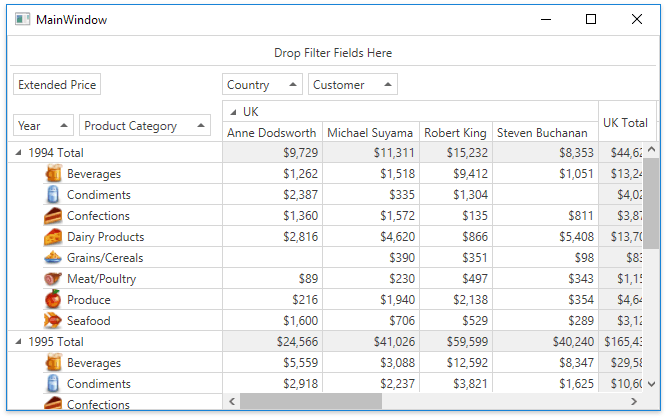PivotGridField.ValueTemplate Property
Gets or sets a template used to display values of the current field. This is a dependency property.
Namespace: DevExpress.Xpf.PivotGrid
Assembly: DevExpress.Xpf.PivotGrid.v20.2.dll
NuGet Packages: DevExpress.WindowsDesktop.Wpf.PivotGrid, DevExpress.Wpf.PivotGrid
Declaration
Property Value
| Type | Description |
|---|---|
| DataTemplate | A DataTemplate object representing the template used to display values of the current field. |
Remarks
If the ValueTemplate is not specified, the field values are displayed via the PivotGridControl.FieldValueTemplate template. The PivotGridField.ActualValueTemplate property allows you to obtain which template is currently used.
You can implement custom logic to choose the required template using the PivotGridField.ValueTemplateSelector property.
Example
This example demonstrates how to define a custom template used to display field values. The template in this example displays field values with images, as shown in the picture below.

Tip
A complete sample project is available in the DevExpress Code Examples database at https://supportcenter.devexpress.com/ticket/details/e2191/pivot-grid-for-wpf-how-to-create-a-field-value-template.
A custom control CategoriesControl displays the field’s text along with the related image. The required information is retrieved from the DataContext which is converted to the FieldValueElementData type.
A template for a certain field is assigned to the PivotGridField.ValueTemplate property . Also, you can use PivotGridControl.FieldValueTemplate property to apply a custom template to all field values.
using DevExpress.Xpf.PivotGrid;
using HowToCreateFieldValueTemplate.CategoryPicturesTableAdapters;
using System;
using System.Collections.Generic;
using System.IO;
using System.Windows;
using System.Windows.Controls;
using System.Windows.Media;
using System.Windows.Media.Imaging;
namespace HowToCreateFieldValueTemplate
{
public class CategoriesControl : Control, IWeakEventListener {
#region static staff
static CategoriesTableAdapter categoriesTableAdapter;
static Dictionary<string, ImageSource> categoriesPictures;
public static readonly DependencyProperty ImageSourceProperty;
static CategoriesControl() {
DefaultStyleKeyProperty.OverrideMetadata(typeof(CategoriesControl),
new FrameworkPropertyMetadata(typeof(CategoriesControl)));
Type ownerType = typeof(CategoriesControl);
ImageSourceProperty = DependencyProperty.Register("ImageSource", typeof(ImageSource),
ownerType, new UIPropertyMetadata());
categoriesPictures = new Dictionary<string, ImageSource>();
}
static CategoriesTableAdapter CategoriesTableAdapter {
get {
if(categoriesTableAdapter == null)
categoriesTableAdapter = new CategoriesTableAdapter();
return categoriesTableAdapter;
}
}
static ImageSource GetImage(string categoryName) {
if(string.IsNullOrEmpty(categoryName)) return null;
if(categoriesPictures.ContainsKey(categoryName)) {
return categoriesPictures[categoryName];
} else {
byte[] icon = CategoriesTableAdapter.GetIconImageByName(categoryName) as byte[];
if(icon == null || icon.Length == 0) {
return null;
}
BitmapDecoder img = new PngBitmapDecoder(new MemoryStream(icon),
BitmapCreateOptions.None,
BitmapCacheOption.OnLoad);
ImageSource imageSource = img.Frames[0];
if(imageSource.Height < 1) return null;
categoriesPictures.Add(categoryName, imageSource);
return imageSource;
}
}
#endregion
public CategoriesControl()
: base() {
FrameworkElementDataContextChangedEventManager.AddListener(this, this);
Unloaded += OnUnloaded;
}
public ImageSource ImageSource {
get { return (ImageSource)GetValue(ImageSourceProperty); }
set { SetValue(ImageSourceProperty, value); }
}
void OnUnloaded(object sender, RoutedEventArgs e) {
ImageSource = null;
}
void OnDataContextChanged() {
SetImageSource();
}
void SetImageSource() {
FieldValueElementData item = this.DataContext as FieldValueElementData;
if(item != null && !item.IsOthersRow && !string.IsNullOrEmpty(item.DisplayText)) {
ImageSource = CategoriesControl.GetImage(item.Value as string);
} else {
ImageSource = null;
}
}
#region IWeakEventListener Members
bool IWeakEventListener.ReceiveWeakEvent(Type managerType, object sender, EventArgs e) {
return OnReceiveWeakEvent(managerType, e);
}
protected virtual bool OnReceiveWeakEvent(Type managerType, EventArgs e) {
if(managerType == typeof(FrameworkElementDataContextChangedEventManager)) {
OnDataContextChanged();
return true;
}
return false;
}
#endregion
#region FrameworkElementDataContextChangedEventManager
public class FrameworkElementDataContextChangedEventManager : WeakEventManager {
static FrameworkElementDataContextChangedEventManager CurrentManager {
get {
Type managerType = typeof(FrameworkElementDataContextChangedEventManager);
FrameworkElementDataContextChangedEventManager currentManager =
(FrameworkElementDataContextChangedEventManager)WeakEventManager
.GetCurrentManager(managerType);
if(currentManager == null) {
currentManager = new FrameworkElementDataContextChangedEventManager();
WeakEventManager.SetCurrentManager(managerType, currentManager);
}
return currentManager;
}
}
FrameworkElementDataContextChangedEventManager() { }
public static void AddListener(FrameworkElement source, IWeakEventListener listener) {
CurrentManager.ProtectedAddListener(source, listener);
}
public static void RemoveListener(FrameworkElement source, IWeakEventListener listener) {
CurrentManager.ProtectedRemoveListener(source, listener);
}
protected override void StartListening(object source) {
FrameworkElement FrameworkElement = (FrameworkElement)source;
FrameworkElement.DataContextChanged += OnDataContextChanged;
}
protected override void StopListening(object source) {
FrameworkElement FrameworkElement = (FrameworkElement)source;
FrameworkElement.DataContextChanged -= OnDataContextChanged;
}
void OnDataContextChanged(object sender, DependencyPropertyChangedEventArgs e) {
base.DeliverEvent(sender, null);
}
}
#endregion
}
}
Related GitHub Examples
The following code snippet (auto-collected from DevExpress Examples) contains a reference to the ValueTemplate property.
Note
The algorithm used to collect these code examples remains a work in progress. Accordingly, the links and snippets below may produce inaccurate results. If you encounter an issue with code examples below, please use the feedback form on this page to report the issue.